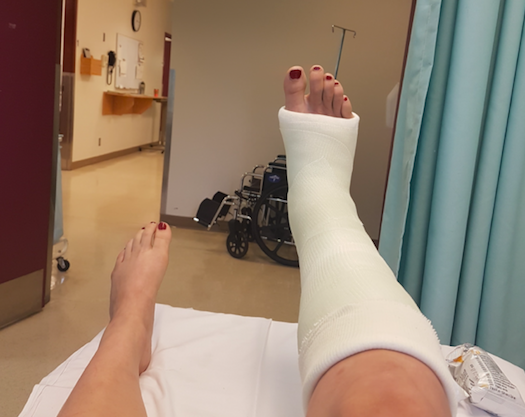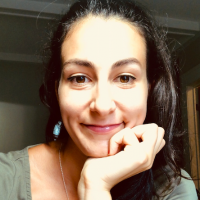The escalator down to the subway was blocked off with yellow tape.
No one around me was bothered; they hurried in their business suits down the staircase.
Meanwhile, one leg in a cast, using my crutches for balance, I hopped miserably down each step. I sighed as I reached the platform, sweating profusely.
“I will not let this injury define me,” I thought, despite also feeling that all people saw as they passed by was a girl in a blue cast, struggling to get down a flight of steps.
The city isn’t built for the disabled. It’s a battleground of staircases and broken handicap buttons forcing those with temporary injuries—or long-term ones—to fight our way to our destinations.
Suddenly, unable to navigate a familiar place in my usual ways, I found myself forced to ask questions that evoked my own lingering insecurities. Who was I when I couldn’t do the things a two-legged, able-bodied person could do? And what, then, really made me who I was?
I’ve always cared a lot about how I appeared to the outside world. I was an avid gym-goer and yogi. Long runs down to the Harbourfront had become my “after-work glass of wine.”
Some of this was good, but much of my desire to exercise was to conform to a certain beauty ideal. I was both consciously aware and subconsciously unaware of the extent to which I had been brainwashed to believe that my outward appearance determined my self-worth.
And so, there I was, panting, sweat-stained, at the bottom of the subway staircase, feeling unrecognizable to myself.
Every day we are bombarded by messages that tell us we are not good enough. We are told that there’s something innately wrong with us that we need to fix with makeup, diet, clothes, exercise. We are told that our self-worth is determined by the number on a scale, and we are told that we are only worthy of love if we are beautiful in the way the media defines it.
How can we begin to unlearn what has been ingrained in our minds since we were old enough to receive and absorb those messages?
This isn’t easy—but here are a few strategies that I have found to help me begin the practice of self-love:
So much of our self-esteem has to do with our own self-talk. I have had to learn to befriend that negative voice and speak back to it when it’s telling me that I am not good enough.
My favourite remedy? Humour. Learn to laugh at yourself.
When I was hobbling up the steps to my apartment on all fours, I could either choose to feel embarrassed and ashamed or, instead, I could choose to laugh at my own ridiculousness (and also feel a little proud for managing to make it up to the top of the steps).
I have started to think about how I can make a real, impactful contribution to the world—something that will remain long after my body has changed (aged, maybe, or simply no longer fits into the same clothes that it did the year before). I’m thinking of acts that take us outside of ourselves and humble us.
Take your own personal sufferings and use them as fuel to drive real change in society.
Practice gratitude. When I first got injured, it was easy to let my mind wander to everything that my injury stopped me from doing. It’s okay to wallow for a few days, whatever your situation may be, but you also have to actively take steps to shift your mindset. As the weeks went on, I began to focus on all the things I could still do. Even more so, I began to think about how the injury could be seen as a gift.
For six weeks, I had a small glimpse into how someone with a physical disability experiences the world. It does not come close to having a long-term condition, but I gained an empathetic eye that I did not have before. I started to thank myself for everything in my life that I still did have, and all that I was still able to do.
I have had to learn that self-love is about having a shift in perspective, in the way you actively choose to show up in the world. I may not be able to be active in the physical sense (go for runs or do yoga), but I am gaining a mental strength that can often be harder to hone.
See, the city might not be built for the disabled—but it isn’t a battleground to fight through; it’s a challenging obstacle course that, once we make our way through it, we come out the other side stronger than when we began.
~
Author: Naomi Boshari
Image: Author’s own
Editor: Leah Sugerman
Copy Editor: Travis May
Social Editor: Yoli Ramazzina







Read 0 comments and reply